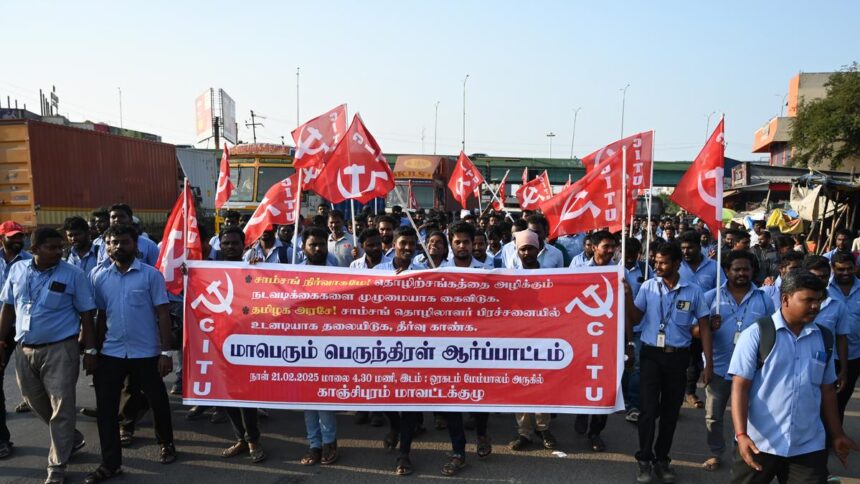Kanchipuram, a vibrant hub for auto and electronics manufacturing in Tamil Nadu, is facing challenges. An upsurge in trade union activities, triggered by a recent 37-day protest at Samsung, has raised alarm among investors and business leaders, who are concerned about potential disruptions in operations.
The unrest began when some employees at Samsung’s Chennai facility, supported by the Centre of Indian Trade Unions (CITU), called for union recognition. The subsequent suspension of three employees linked to the union intensified the situation. Production interruptions at Samsung alone have reportedly resulted in a loss of $100 million, as highlighted by the company in a case presented to the Madras High Court last month. This turmoil has prompted companies across the Sriperumbudur-Oragadam corridor, home to global giants like Foxconn, Renault Nissan, and Dell, to question the stability of Tamil Nadu’s industrial landscape.
KR Shyam Sundar, a Professor of Practice at the Management Development Institute (MDI) in Gurgaon, asserts that the resolution of the Samsung conflict will have extensive implications for the entire electronics sector in Tamil Nadu.
“Samsung is trying to convey that it will engage only with a non-political union,” he remarked. “However, this tactic could result in short-term supply chain issues and may motivate more workers in the area to pursue unionization.”
Unlike states such as Maharashtra, Gujarat, or Karnataka, Tamil Nadu lacks legal requirements for companies to acknowledge and negotiate with trade unions—a factor that experts believe is pivotal in the ongoing dispute.
Samsung India factory at Sriperumbudur, Chennai.
| Photo Credit: BIJOY GHOSH
The Tamil Nadu government finds itself in a challenging position, trying to balance its pro-industry policies with the increasing influence of politically supported trade unions. Development economist Venkatesh Athreya notes that the government has several options for intervention.
Meanwhile, the movement toward unionization is gaining momentum. CITU State President A. Soundararajan disclosed that the union already operates in approximately 60 factories and has received requests from workers in over 250 additional units to establish unions. This has caused apprehension among businesses, with one executive from a significant component manufacturing firm stating, “It has created a negative atmosphere.”
The Sriperumbudur and Oragadam area, recognized as one of India’s largest automobile and electronics hubs, has already witnessed union activities at companies like Yamaha and Royal Enfield in recent years. Now, Samsung is facing similar challenges.
An executive from a prominent Oragadam-based company warned, “If these issues persist, investors might hesitate to invest in Tamil Nadu, reminiscent of the situation with Kitex in Kerala.”
Senior advocate S. Ravindran pointed out that growing industrial unrest in Sriperumbudur and adjacent areas is largely due to the “unrealistic and outdated” agendas of certain trade unions. He urged the State government to take a more proactive role, utilizing provisions under Section 10(3) and 10-B of the Industrial Disputes Act to refer conflicts for resolution and to prohibit strikes and lockouts in essential industries.
(With contributions from Sindhu Hariharan)










